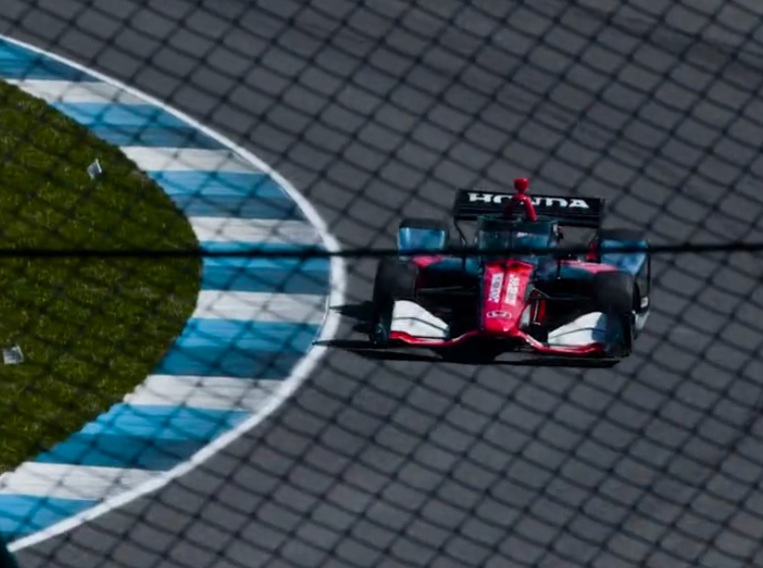Experimenting with fuel for IndyCars has been going on since 1965, so it is not surprising for that tradition to continue in 2022.
While “green energy” is not anything exciting for most America-First conservatives to hear about- perhaps the idea of advanced biofuels as an “energy security, military flexibility, economic development” solution would at least be in the top 10 of good ideas for public policy to focus on- to us.
So just think about this with me. y’all.
Many Conservatives want homegrown energy solutions. I am thinking: Let’s bring energy production back home again. That sounds like it should be a moto or a song or something.
If you like how that sounds- then you will like this story about IndyCars with alternative fuel, because the engines sound like an orchestra.
In a trial run, IndyCars were filled with E85 Bio-fuel for the first time at the Indianapolis Motor Speedway (IMS). E85 is an alternative fuel. It is not gasoline.
E85 is an abbreviation typically referring to an ethanol fuel blend of 85% ethanol fuel and 15% gasoline or other hydrocarbons by volume.
Conserving fuel is huge for racing.
Can you imagine if IndyCar goes Bio-Fuel? Those days may not be far off. Testing of new engine, that has a new sound- is in the books. It happened on Monday.
“New 2.4-liter twin-turbo V6 NTT IndyCar Series engines from Chevrolet and Honda turned their first laps in anger on Monday at the Indianapolis Motor Speedway road course. Honda deployed Chip Ganassi Racing and six-time champion Scott Dixon as its test team and Team Penske had Josef Newgarden in motion on behalf of Chevy,” Marshall Pruett wrote for Racer.com.
Watch and listen, here is what Honda said:
New engine. New sound. Even more power. The all new 2.4-liter E85 bio-fueled @Honda engine has been developed fully in-house by the inspiring men and women at HPD in California to power @IndyCar into the future.
New engine. New sound. Even more power.
The all new 2.4-liter E85 bio-fueled @Honda engine has been developed fully in-house by the inspiring men and women at HPD in California to power @IndyCar into the future.#PoweredByHonda // #INDYCAR pic.twitter.com/68mgyh9yjR
— Honda Racing US (@HondaRacing_US) March 28, 2022
More power? Do you hear the lower tone? It almost sounds like an orchestra!
Journalist and podcaster, Marshall Pruett posted some footage of the new bio-fuel engines at the Indianapolis Motor Speedway (IMS)- and the sound of the engine is noticeably different than other IndyCars.
Read Pruett’s full article about the day’s events
First look at the new 2024 Chevy #IndyCar engine in action during testing at IMS. pic.twitter.com/FA37F8QymL
— Marshall Pruett (@marshallpruett) March 28, 2022
The Bio-Fuel car has a much lower tone:
And here's the new 2024 Honda #IndyCar engine turning its first laps at IMS. Should note the ambient is a frosty 36F/2C. pic.twitter.com/NSTg4OJsDV
— Marshall Pruett (@marshallpruett) March 28, 2022
Here are some stats about IndyCar
- All of them use the same carbon-fiber chassis and weigh in at 1,580 lbs. each;
- They also feature the same two-liter twin-turbo direct-injected V-6 engines made by either Chevrolet or Honda;
- Because these engines are optimized for performance, they average about four miles a gallon;
- During the Indy 500 race, that means each car will consume about 0.6 gallons per lap or 125 gallons if they complete the race!
So we are thinking of conserving- right? OK- then there might be some good reasons for Bio-Fuel. Check out this 2020 press release about it’s use to win races and think.. homegrown fuel that we need for energy independence.
“2 more laps on 4 or 5 less gallons.” That’s how Mid-Ohio Honda Indy 200 Winner Scott Dixon compared, in the post-race press conference, the power and efficiency of this year’s E85-powered 2.2L (134 cubic inches) direct injected turbocharged engine that produces a minimum of 35% more horsepower (and lasts for 1,800 racing miles) to last year’s naturally aspired 3.5 L (214 cubic inches), ported fuel injection V8 engine.
As Advanced Biofuels USA’s senior green racing editor, Bob Kozak writes in today’s online post, “This past weekend at the beautiful Mid-Ohio race course the new generation of IndyCars completed a high pressure, maximum performance laboratory session that demonstrated beyond a doubt the fuel economy and performance benefits of high ethanol blend fuels in small displacement, turbocharged engines. This controlled experiment was called the Mid-Ohio Honda Indy 200.”
Advanced Biofuels USA covers green racing to show how racing technology combined with biofuels helps improve production car efficiency. In all major US racing series; NASCAR, IndyCar, and American Le Mans, ethanol is now almost commonplace and the racing teams are using its high octane and vaporization characteristics to improve performance.
However, because of the anti-ethanol onslaught, many people have been led to believe that the use of ethanol in race cars is simply a promotional deal and has no performance or technological significance.
Kozak explains in this readable, yet technical article, the latest news from the race circuit test beds and the performance that can be obtained from E85 in engines optimized to take advantage of the unique characteristics of this economical, renewable, home-grown fuel.
The complete article is available online at http://advancedbiofuelsusa.info/e-85-small-displacement-turbocharged-engine-high-efficiency-and-mileage-proof-from-the-racetrack
Includes photos by Joanne Ivancic.
Advanced Biofuels USA, a nonprofit educational organization advocates for the adoption of advanced biofuels as energy security, military flexibility, economic development and climate change mitigation/pollution control solution. Our key tool for accomplishing this is our web site,www.AdvancedBiofuelsUSA.org, a resource for everyone from opinion leaders, decision-makers and legislators to industry professionals, investors, feedstock growers and researchers; as well as teachers and students.
Yeah- I like that idea- let’s bring our energy back home again.. and if you are an Indy fan- you know where I am headed..
